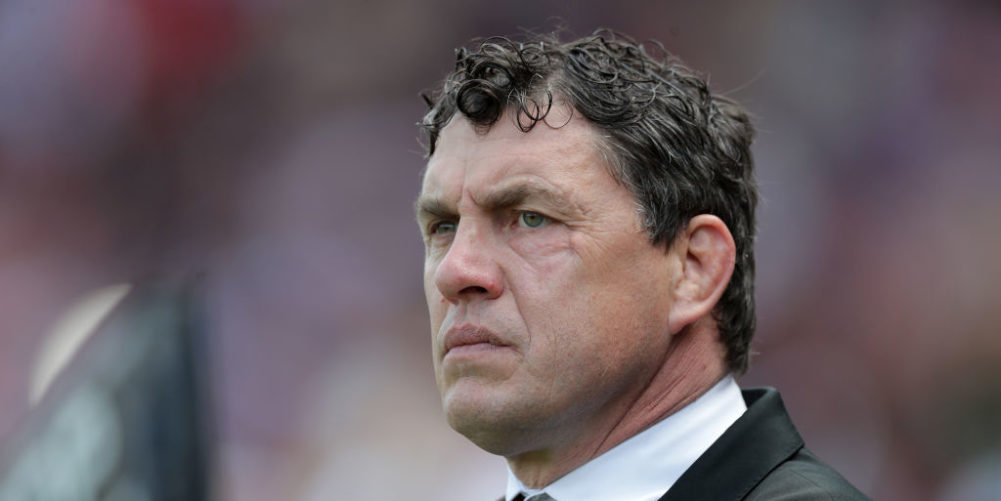If a week is currently a long time in everyday pandemic-era politics, it’s an aeon in its French professional rugby subset. On April 13, French president Emmanuel Macron informed the nation that, as expected, the lockdown period would be extended to May 11.
The LNR quickly revealed they were considering an option for rescuing something from the ragged stump of the 2019/20 professional season: shortened play-off runs to the Top 14 and ProD2 championships either in July – with the showpiece Top 14 final on July 18 – or in August, as a curtain-raiser to next season.
This week, following updates from the government on the pace of restriction-easing – and a long video conference of club presidents – the LNR ditched July as an option. All their eggs, worth a portion of the €15m in broadcast rights payments held-back by pay-TV broadcaster Canal Plus, are now in the August basket.
The plan means leaders Bordeaux would face fourth-placed Toulon while Lyon, second, would play Racing 92, third, in the semi-finals, with the final scheduled for August 26, the currently scheduled opening day of the 2020-2021 season.
But the agreement in principle is hardly perfect – and hardly unanimous. And it barely hides the cracks of a club president-level scrap that but for the requirements of social distancing and the technological wonder of video conferencing would have seen blood on the boardroom carpet.
Not that long ago the rugby world in France looked relatively calm. A storm over Bernard Laporte’s World Club Rugby Championship plans briefly raged in a teacup, but on the face of it the professional game’s 30 club presidents were rubbing along quite nicely. For cats in a sack.
Now, the self-interest claws are back out.
“Restarting a season with the play-offs, just for the principle of having them, doesn’t make sense,” Toulouse president Didier Lacroix said after the video conference. He wants the season to be completed in full. It’s easy to see why.
Toulouse, with no billionaire patron, depend heavily on ticket revenue. With no rugby, and no fans’ spending money, the club are hemorrhaging millions of euros. It explains why Lacroix is also pathologically opposed to closed-door matches. “Rugby, in its current economy, cannot live behind closed doors,” he said.
“We can possibly play one or two matches, but behind closed doors in Toulouse and also in other clubs, current rugby cannot last more than a month and a half.”
The four-time European champions are one of six Top 14 clubs in serious danger of failing strict financial requirements of rugby’s financial watchdog, the DNACG, according to
L’Equipe. The sports daily’s report follows the publication of a DNACG study requested by players’ union Provale, that said 16 clubs in the Top 14 and ProD2 were in serious financial straits.
No names were mentioned in initial reporting, but L’Equipe later identified what it said were the six worst-off in the top flight. As well as Toulouse, it mentioned Bordeaux, Lyon, La Rochelle, Toulouse, Pau and Castres. Three others – Toulon, Stade Francais and Racing 92 – were reported to be on thin ice.
Lacroix has insisted that Toulouse, “won’t head to the commercial court tomorrow morning to file for bankruptcy”.
The LNR has also said they will take out a €15m loan – a sum matching the projected loss in TV revenue – to help clubs in difficulty.
But the financial pressure keeps on mounting. The French government this week announc-ed a tightening of their furlough rules. Payments will be limited to a smaller multiple of the monthly minimum wage, leaving businesses to make up any shortfall.
For most employers, this is not a huge issue. For professional rugby clubs, with highly paid players and staff on chômage partiel (partial employment), it is of more serious concern.
Lacroix was not the first president to break ranks. Clermont’s Eric de Cromieres wasted little time after Macron’s April 13 address to declare the Top 14 season over. “It doesn’t seem possible to me to train players with contacts, scrums, rucks, while respecting the medical rules asked of us,” he said.
But Laurent Marti – whose Bordeaux side were eight points clear at the top of the table, when the Top 14 was suspended after 17 rounds – fired back. “Ending the season (properly) is our position, a will shared by the LNR and the majority of Top 14 presidents,” he said. “We don’t have to finish the season in July… if we extend the deadline, we can hope to finish (in front of) a crowd.”
Despite the financial pressure on Toulouse, one point adrift of the sixth and final Champions Cup slot after 17 of 26 scheduled Top 14 regular-season weekends, it has been reported that the club would boycott a proposed European qualification match at Clermont pencilled in for a free weekend in August. Instead, they have suggested an expanded 24-team competition featuring eight pools of three.
No-one can know whether any of these games, if they go ahead at all, will take place behind closed doors. But some TV money may be recouped. That’s valuable currency.
It follows, however, that the 2020/21 season will be a player-welfare hellscape.
Dates for the knockout phase of the stalled 2019/20 Champions and Challenge Cups have yet to be added to the already overloaded calendar. For obvious reasons, the EPCR want to finish this year’s competition before next season’s kicks off – which means three weekends in September must be given over to European rugby before the pool phase of the new competition begins in October.
The remaining matches of the 2020 Six Nations also have to be taken into consideration. France’s final game, against Ireland, is unofficially pencilled in for October 31 at Stade de France.
That game would then lead straight into the November Tests. With nine games currently in the international calendar for France during the 2020/21 domestic season, players on Fabien Galthie’s speed dial could well be on international duty for 14 out of 26 weeks of the regular Top 14 season, while club rugby – which usually takes advantage of the international calendar to rest and regroup – would continue almost unabated.
As Robins Tchale-Watchou, president of players’ union Provale said, there’s ‘a before and an after’ to the coronavirus pandemic for rugby. The immediate aftermath looks like it could take a serious toll on players.
But, before anyone gets back on a pitch, whether in front of a crowd or in an empty stadium, it’s scrapping as usual in French rugby’s corridors of power.























